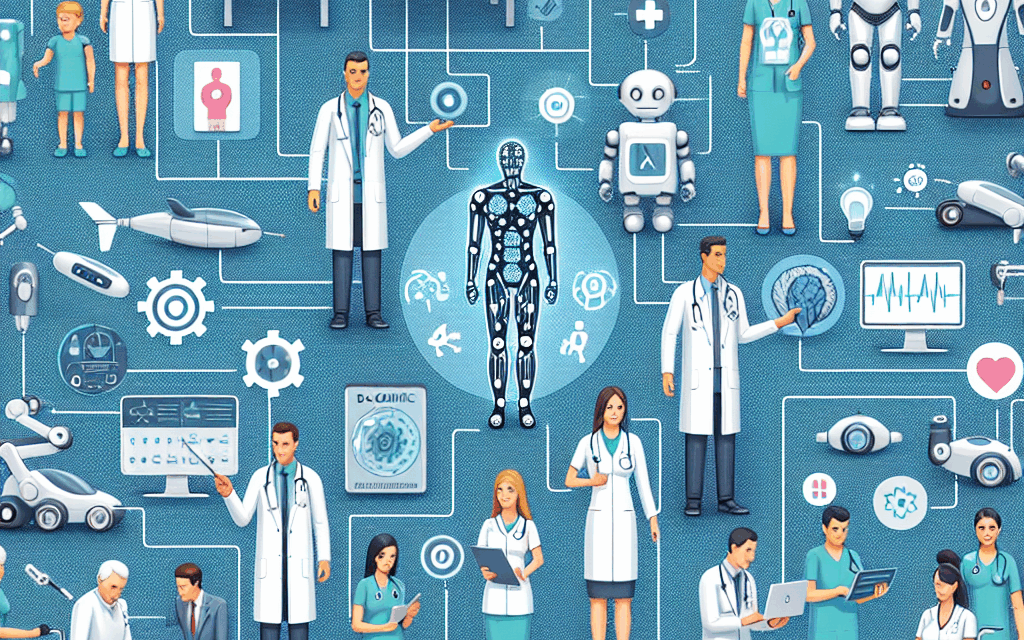The Case for Healthcare Providers to Adopt AI Technology
Artificial Intelligence (AI) is revolutionizing various sectors, and healthcare is no exception. The integration of AI technology into healthcare systems is not merely a trend; it is a necessity for improving patient outcomes, enhancing operational efficiency, and reducing costs. This article explores the compelling reasons for healthcare providers to adopt AI technology, structured around five key subtopics: improving diagnostic accuracy, enhancing patient care, streamlining administrative processes, facilitating personalized medicine, and addressing healthcare disparities.
Improving Diagnostic Accuracy
One of the most significant advantages of AI in healthcare is its ability to improve diagnostic accuracy. Traditional diagnostic methods can be prone to human error, leading to misdiagnoses and delayed treatments. AI technologies, particularly machine learning algorithms, can analyze vast amounts of data quickly and accurately, providing healthcare professionals with reliable diagnostic support.
AI systems can process medical images, such as X-rays, MRIs, and CT scans, with remarkable precision. For instance, a study published in the journal *Nature* demonstrated that an AI algorithm could outperform radiologists in detecting breast cancer in mammograms. The AI system achieved a sensitivity of 94.6%, compared to 88.0% for human radiologists. This capability not only enhances diagnostic accuracy but also reduces the workload on healthcare professionals, allowing them to focus on patient care.
Moreover, AI can assist in diagnosing complex conditions that require the integration of multiple data sources. For example, IBM’s Watson Health uses natural language processing to analyze unstructured data from medical literature, clinical notes, and patient records. By synthesizing this information, Watson can provide oncologists with evidence-based treatment recommendations tailored to individual patients. This level of diagnostic support is invaluable in oncology, where treatment options are often complex and rapidly evolving.
In addition to imaging and oncology, AI is making strides in other areas of diagnostics. For instance, AI algorithms are being developed to predict the onset of diseases such as diabetes and cardiovascular conditions by analyzing electronic health records (EHRs). By identifying risk factors and patterns in patient data, AI can alert healthcare providers to potential health issues before they become critical, enabling proactive interventions.
- AI enhances diagnostic accuracy through:
- Image analysis (e.g., radiology, pathology)
- Natural language processing for clinical data
- Predictive analytics for disease onset
In conclusion, the adoption of AI technology in diagnostics not only improves accuracy but also empowers healthcare providers to deliver timely and effective care. As AI continues to evolve, its role in diagnostics will likely expand, further enhancing patient outcomes.
Enhancing Patient Care
AI technology has the potential to transform patient care by providing personalized experiences and improving communication between patients and healthcare providers. One of the most significant advancements in this area is the development of AI-powered chatbots and virtual health assistants. These tools can provide patients with immediate access to information and support, reducing the burden on healthcare staff.
For example, chatbots can answer common patient queries, schedule appointments, and provide medication reminders. A study conducted by the *Journal of Medical Internet Research* found that patients who interacted with AI chatbots reported higher satisfaction levels due to the immediate responses and 24/7 availability. This accessibility is particularly beneficial for patients with chronic conditions who require ongoing support and monitoring.
AI can also enhance patient care through remote monitoring and telehealth services. Wearable devices equipped with AI algorithms can track vital signs and other health metrics in real-time, alerting healthcare providers to any concerning changes. For instance, the Apple Watch has integrated features that monitor heart rate and detect irregularities, potentially identifying conditions like atrial fibrillation before they lead to serious complications.
Furthermore, AI can facilitate better care coordination among healthcare teams. By analyzing patient data from various sources, AI systems can provide healthcare providers with a comprehensive view of a patient’s health history, treatment plans, and progress. This holistic approach enables more informed decision-making and fosters collaboration among specialists, ultimately leading to improved patient outcomes.
- AI enhances patient care through:
- AI-powered chatbots for immediate support
- Remote monitoring via wearable devices
- Improved care coordination among healthcare teams
In summary, the integration of AI technology into patient care not only enhances the patient experience but also empowers healthcare providers to deliver more effective and personalized care. As AI continues to advance, its role in patient care will likely expand, further improving health outcomes.
Streamlining Administrative Processes
Administrative tasks in healthcare can be time-consuming and often detract from the time healthcare providers spend with patients. AI technology offers solutions to streamline these processes, improving efficiency and reducing costs. One of the most significant applications of AI in administration is in the management of electronic health records (EHRs).
AI algorithms can automate data entry, coding, and billing processes, significantly reducing the administrative burden on healthcare staff. For instance, natural language processing can be used to extract relevant information from clinical notes and populate EHRs automatically. This automation not only saves time but also minimizes the risk of errors associated with manual data entry.
Additionally, AI can enhance scheduling and resource allocation within healthcare facilities. Predictive analytics can analyze patient flow patterns and optimize staff schedules accordingly. For example, a hospital may use AI to predict peak admission times and adjust staffing levels to ensure adequate coverage. This proactive approach can lead to improved patient satisfaction and reduced wait times.
AI can also assist in managing supply chain logistics within healthcare organizations. By analyzing usage patterns and inventory levels, AI systems can predict when supplies will run low and automate reordering processes. This capability is particularly crucial in times of crisis, such as during a pandemic, when the demand for medical supplies can surge unexpectedly.
- AI streamlines administrative processes through:
- Automating EHR management and data entry
- Optimizing scheduling and resource allocation
- Enhancing supply chain logistics
In conclusion, the adoption of AI technology in administrative processes can lead to significant improvements in efficiency and cost savings for healthcare providers. By reducing the administrative burden, healthcare professionals can focus more on patient care, ultimately enhancing the overall quality of healthcare delivery.
Facilitating Personalized Medicine
Personalized medicine, also known as precision medicine, is an emerging approach that tailors medical treatment to the individual characteristics of each patient. AI technology plays a crucial role in facilitating personalized medicine by analyzing vast amounts of data to identify patterns and correlations that can inform treatment decisions.
One of the most significant applications of AI in personalized medicine is in genomics. AI algorithms can analyze genomic data to identify mutations and variations that may influence a patient’s response to specific treatments. For example, AI has been used to develop targeted therapies for cancer patients based on their unique genetic profiles. By understanding the genetic basis of a patient’s cancer, oncologists can select treatments that are more likely to be effective, improving outcomes and reducing unnecessary side effects.
Moreover, AI can integrate data from various sources, including EHRs, clinical trials, and patient-reported outcomes, to provide a comprehensive view of a patient’s health. This holistic approach enables healthcare providers to make more informed decisions about treatment options and monitor patient progress more effectively. For instance, AI can analyze data from wearable devices to track a patient’s response to treatment in real-time, allowing for timely adjustments to therapy as needed.
AI is also being used to develop predictive models that can forecast how patients will respond to specific treatments based on their unique characteristics. For example, researchers at Stanford University developed an AI model that predicts the likelihood of a patient developing diabetes based on their medical history, lifestyle factors, and genetic predispositions. This predictive capability allows for early interventions and personalized prevention strategies.
- AI facilitates personalized medicine through:
- Genomic analysis for targeted therapies
- Integration of diverse health data for informed decision-making
- Predictive modeling for treatment response
In summary, the integration of AI technology into personalized medicine holds great promise for improving patient outcomes. By leveraging data-driven insights, healthcare providers can tailor treatments to individual patients, enhancing the effectiveness of care and minimizing adverse effects.
Addressing Healthcare Disparities
Healthcare disparities refer to the differences in health outcomes and access to care among various population groups. These disparities can be influenced by factors such as socioeconomic status, race, ethnicity, and geographic location. AI technology has the potential to address these disparities by improving access to care and identifying at-risk populations.
One way AI can help reduce healthcare disparities is through telehealth services. AI-powered telehealth platforms can connect patients in underserved areas with healthcare providers, overcoming geographical barriers to access. For instance, during the COVID-19 pandemic, many healthcare organizations adopted telehealth solutions to ensure continuity of care for patients who could not visit clinics in person. AI can enhance these platforms by providing triage support, helping patients navigate their healthcare needs more effectively.
AI can also be used to identify at-risk populations by analyzing social determinants of health (SDOH) data. By integrating SDOH data with clinical information, AI algorithms can identify individuals who may be at higher risk for certain health conditions due to factors such as income, education, and access to transportation. This information can help healthcare providers target interventions and resources to those who need them most.
Furthermore, AI can assist in developing culturally competent care strategies. By analyzing patient data from diverse populations, AI can identify trends and preferences that inform culturally sensitive treatment approaches. For example, AI can help healthcare providers understand the unique health beliefs and practices of different cultural groups, enabling them to deliver care that is respectful and relevant to patients’ backgrounds.
- AI addresses healthcare disparities through:
- Telehealth services for improved access
- Identifying at-risk populations using SDOH data
- Developing culturally competent care strategies
In conclusion, the adoption of AI technology in healthcare has the potential to address disparities in access and outcomes. By leveraging data-driven insights and innovative solutions, healthcare providers can work towards a more equitable healthcare system that serves all populations effectively.
Conclusion
The case for healthcare providers to adopt AI technology is compelling and multifaceted. From improving diagnostic accuracy and enhancing patient care to streamlining administrative processes, facilitating personalized medicine, and addressing healthcare disparities, AI offers numerous benefits that can transform the healthcare landscape.
As healthcare continues to evolve, the integration of AI technology will be essential for meeting the challenges of an increasingly complex and demanding environment. By embracing AI, healthcare providers can improve patient outcomes, enhance operational efficiency, and ultimately deliver higher-quality care to all patients.
In summary, the adoption of AI technology in healthcare is not just an option; it is a necessity for the future of medicine. As we move forward, it is crucial for healthcare organizations to invest in AI solutions and foster a culture of innovation that prioritizes patient-centered care and equity in health outcomes.





